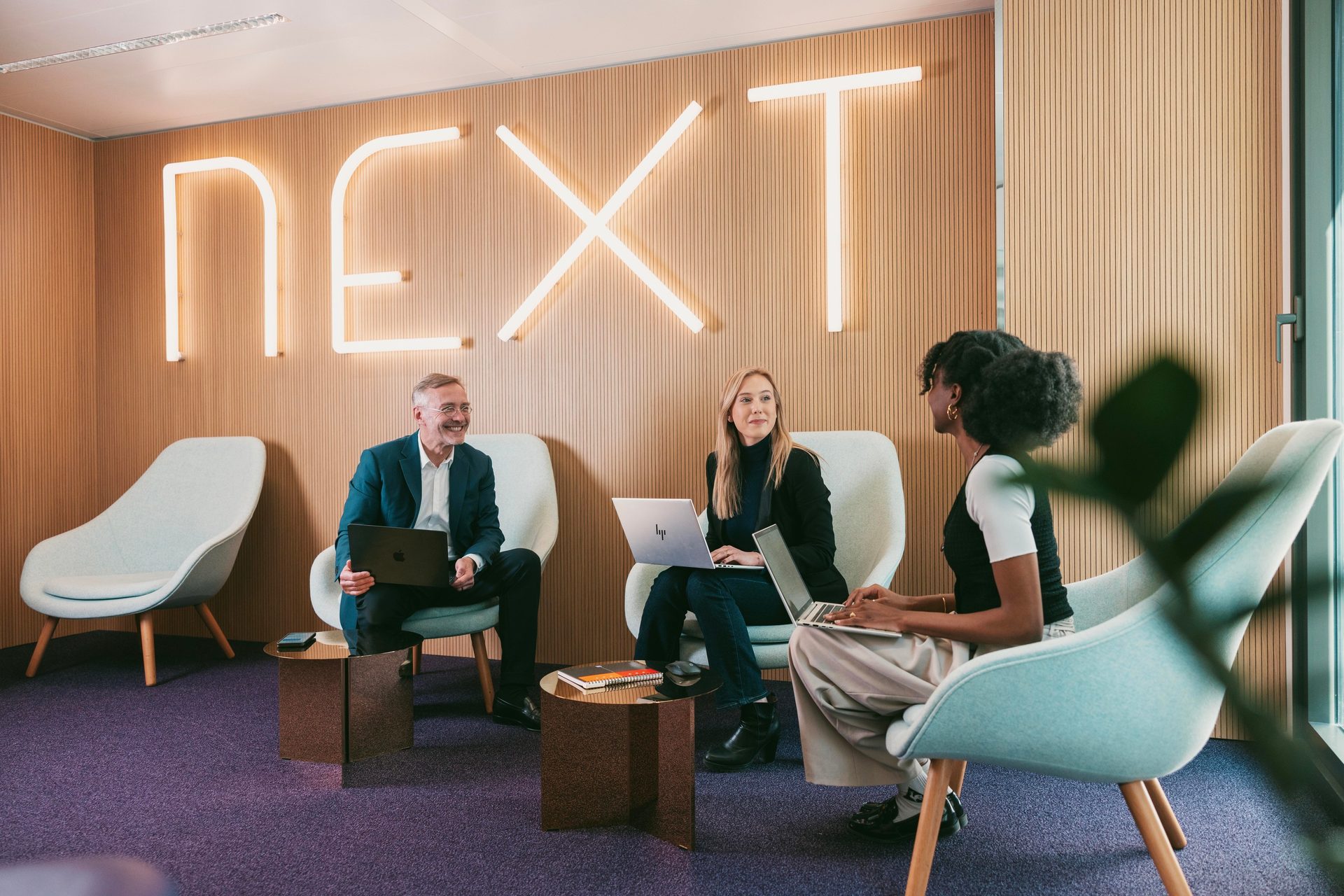CHAPTER 1
OPEN INNOVATION IN THE AI ERA
EXECUTIVE SUMMARY

EXECUTIVE
SUMMARY
Artificial intelligence (AI) is reshaping every aspect of business, cutting across industries and redefining operations, strategy, and innovation. Companies are racing to harness its transformative potential, but many large organisations are struggling to keep pace. The rapid evolution of AI is only set to continue and coupled with a shortage of specialised talent, lack of strategy and alignment over technological exploration, is creating a growing gap between ambition and execution.
Against this backdrop, Open Innovation has emerged as a key mechanism for corporates to bridge this gap. By collaborating with agile, tech-driven startups, large businesses can accelerate their AI strategies, bypassing traditional barriers and unlocking new value faster.
This report, produced in partnership with Ipsos and INSEAD professors, draws on a survey of 1,643 public and private organisations, and startups. The data covers 12 European countries and 12 industries, offering a detailed look at evolving collaboration trends, challenges, and success strategies. We explore how Open Innovation is helping corporates navigate AI adoption and remain competitive in a fast-changing market.
Fabrice Asvazadourian, CEO, Sopra Steria Next
Fabrice Asvazadourian, CEO at Sopra Steria Next



AI as a strategic imperative
AI is now central to business strategies. From predictive analytics to generative AI, companies are embedding AI into every layer of their operations. Yet many corporates struggle to scale AI internally, hindered by talent shortages, high development costs, and the relentless pace of technological change.
Open Innovation offers a solution. By partnering with startups, corporates gain rapid access to cutting-edge AI tools and expertise, enabling faster adoption and improved outcomes.
The data highlights this trend:



of corporates have completed AI-focused Open Innovation projects over the last two years

57%
of AI projects focus on Generative AI

62%


Open Innovation:
from optional to essential
What was once experimental is now essential. In 2025, 80% of corporates consider Open Innovation important or mission critical — up from 67% in 2023. Those that fail to collaborate risk losing their competitive advantage.
Open Innovation success rates, as in reaching set objectives, have also improved, rising from 58% in 2023 to 65% in 2025. However, challenges remain. Cultural differences between corporates and startups continue to hinder collaboration, with startups identifying this as the biggest barrier.
Startups bring agility, speed, and fresh thinking — qualities corporates often lack. Their role in accelerating AI adoption is undeniable.
Yet, a disconnect remains. While 70% of corporates who have run AI collaborations view startups as vital to their AI strategy, only 47% of startups believe corporates see them that way.

Why startups are key to AI strategies
Open Innovation can help us solve some of our most challenging problems and promotes collaboration with partners across different sectors to look for new and exciting ways of doing things to make a difference to people’s lives. We’ve worked with brilliant innovation partners to help us make London a better place to live, work and visit in line with the Mayor’s Transport Strategy.


Christina Calderato
Director of Strategy, Transport for London

Open Innovation can help us solve some of our most challenging problems and promotes collaboration with partners across different sectors to look for new and exciting ways of doing things to make a difference to people’s lives. We’ve worked with brilliant innovation partners to help us make London a better place to live, work and visit in line with the Mayor’s Transport Strategy.


Christina Calderato
Director of Strategy, Transport for London


Christina Calderato
Director of Strategy, Transport for London

Open Innovation can help us solve some of our most challenging problems and promotes collaboration with partners across different sectors to look for new and exciting ways of doing things to make a difference to people’s lives. We’ve worked with brilliant innovation partners to help us make London a better place to live, work and visit in line with the Mayor’s Transport Strategy.

Open Innovation can help us solve some of our most challenging problems and promotes collaboration with partners across different sectors to look for new and exciting ways of doing things to make a difference to people’s lives. We’ve worked with brilliant innovation partners to help us make London a better place to live, work and visit in line with the Mayor’s Transport Strategy.


Christina Calderato
Director of Strategy, Transport for London



Accelerating into the AI future
As AI continues to transform industries, the pressure to innovate, experiment and put new solutions into production has never been greater. Open Innovation offers corporates a clear path to scale AI adoption, tap into new expertise, and remain competitive.
AI-focused Open Innovation introduces unique complexities compared to other forms of corporate–startup collaboration. Effective AI development requires deep access to corporate data, raising concerns around security, accessibility, and IP ownership. Corporates are often reluctant to share sensitive data, while startups face challenges with data quality and standardisation — factors that can hinder model performance and scalability.
But success demands more than mere partnerships - it requires strategic alignment, top management focus, and dedication. Corporates that have a clear innovation strategy and operating model, where Open Innovation is embedded in their strategies, will best be positioned to thrive in the AI era and all the future eras which will be driven by new tech.
The race is on. The question is:



How fast
can you move?
Key takeaways



